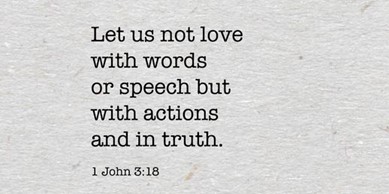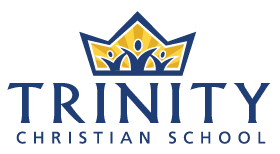
“truth” and “reconciliation”
Dear Parents,
Truth & Reconciliation / Orange Shirt Day
Once again this year on Sept. 30th, people across the country are recognizing the National Day of Truth and Reconciliation. It has been established as a federal holiday to, “recognize the colonial legacy of residential schools, honour Indigenous survivors, and is vital to the ongoing reconciliation process.” The intent is to bring awareness to the history of Residential schools in Canada as well as the significance of treaty promises in the work toward justice and healing.
The question has come up in various forms as to why we recognize Orange Shirt Day at Trinity and what is our role within the concept of Truth and Reconciliation. Are we simply being culturally relevant and following the norms of society by wearing Orange and talking about residential schools?
These questions are certainly valid and require a great deal of thought. As a Christian school, we certainly don’t want to do things for the sake of following worldly agendas or to be like other schools. There must be reasons that align with our Worldview and Statement of Faith, making it important and relevant to who we are.
While we may not come to a consensus on our reasoning, I’d like to propose these points for consideration, as they are part of our rationale as a school for highlighting this day and speaking about various themes that emerge in conjunction with it.
As Christians, the concept of “truth” and “reconciliation” are themes that emerge in the Bible and in particular in the New Testament church. In 2 Corinthians 5:18-20, the Apostle Paul writes that God gave us the ministry of reconciliations, as ones who have been reconciled by Christ. In other words, we are called to participate actively in reconciliation, as agents of Shalom on this earth.
We also know that truth is equally important. It is captured well in 1 John 3:18, where John challenges us to, “not love with words or speech, but with actions and truth.”
Truth means recognizing and acknowledging that residential schools are a dark part of Canada’s story. Sadly, there were many terrible things that took place under the name of “God and Country”. They were not a good representation of our country and much less of God, who we know cares deeply for each child that He has created and loves them infinitely. Philosopher George Santayana penned the phrase, “Those who cannot remember the past are condemned to repeat it.” We want to make sure that our students learn from the mistakes of the past, so that they can apply Biblical truths of empathy and care to their lives to ensure a better future.
We also see many examples in scripture where nations are held accountable for their mistreatment of people and actions. In the Book of Amos, God draws a direct parallel between harm to people groups (ex. carrying into exile people groups, killing others to expand their borders, and oppressing the poor) and subsequent judgement. In His mercy, He reminds us to seek His face, return to Him, right wrongs, and He will turn His wrath and restore His people. It’s worth noting that God is holding the Nation in contempt and not individuals. One of the distinctions between a Christian and a Secular Humanistic perspective is that we will not solve anything by living in personal guilt and taking on the sins of others, but rather it is about collectively acknowledging the wrong done and then asking God what we can do about it.The goal is not to make any people group singled out to be “bad” or “responsible”, but to recognize that the system failed and that harm was done, even by many who were not willingly doing so or even had good intentions.
This dovetails into the other emerging theme of this day, which is reconciliation. We know that God invites us all to work toward reconciliation and restoration. There are many ways that we can do that tangibly. For example, we can take steps towards building relationships with some of our Indigenous neighbours; support those who are partnering with Indigenous communities to bring the gospel message of hope and love that Jesus provides; and join in taking care of Creation which our God has so beautifully created.
We recognize that this is a sensitive topic and will do our best to explain things in terms that are age appropriate and culturally sensitive.We also recognize that there are many differing viewpoints on the best way to recognize this day and the actions that we can take to bring reconciliation. This may mean that you do not wish to participate in the same way, and we respect that. We ask though, that you continue to have conversations with your children about this important topic, as they learn about the Indigenous nations in Canada and what it means to be God’s ambassadors who bring reconciliation through Christ.
Blessings,
J-D Lussier, Principal
